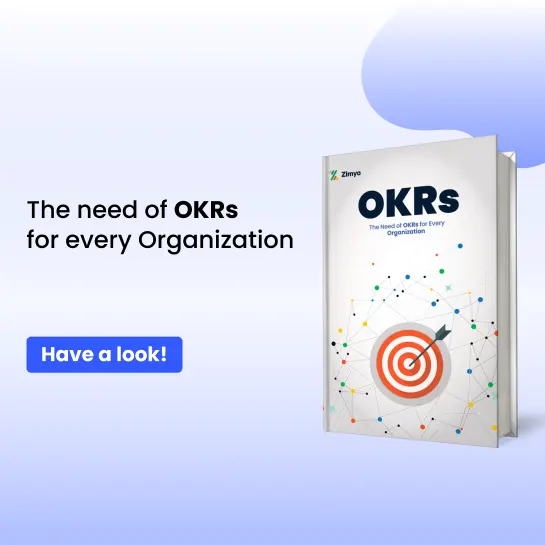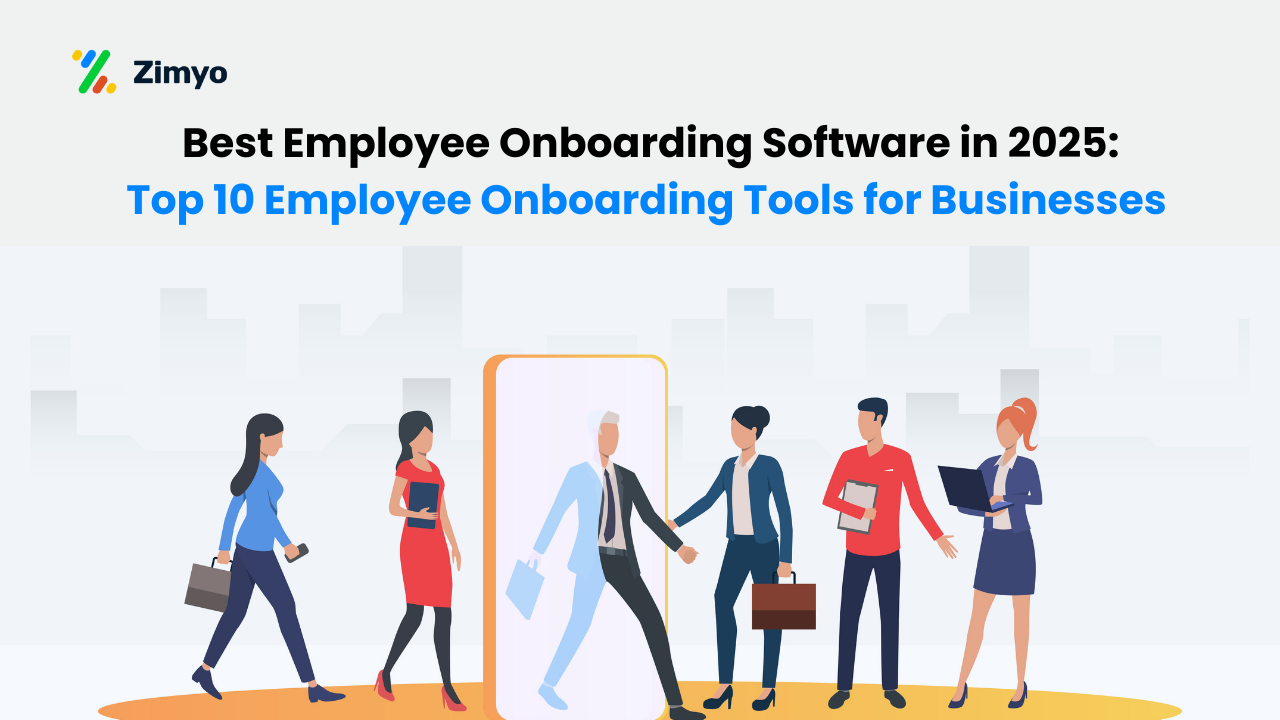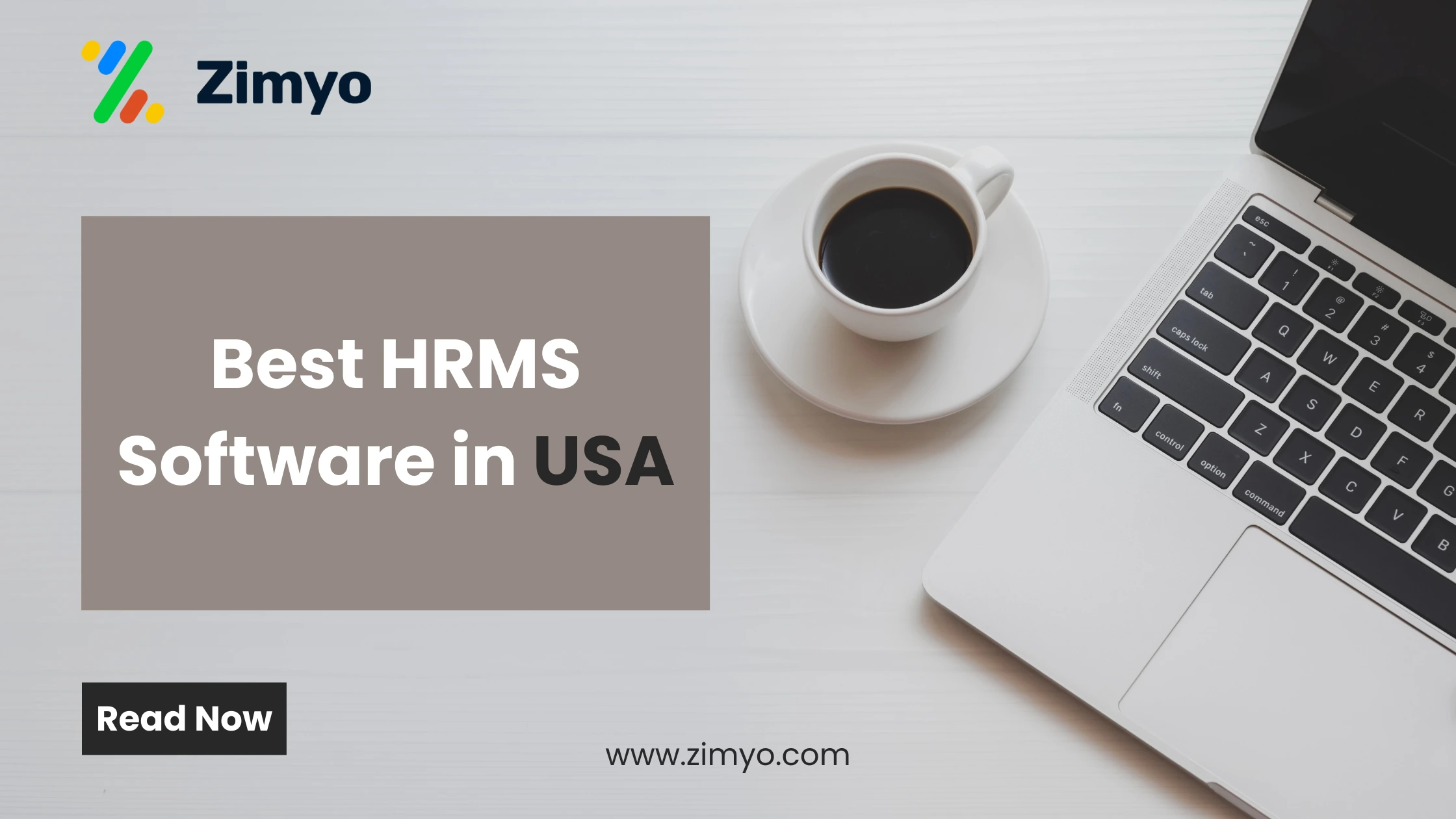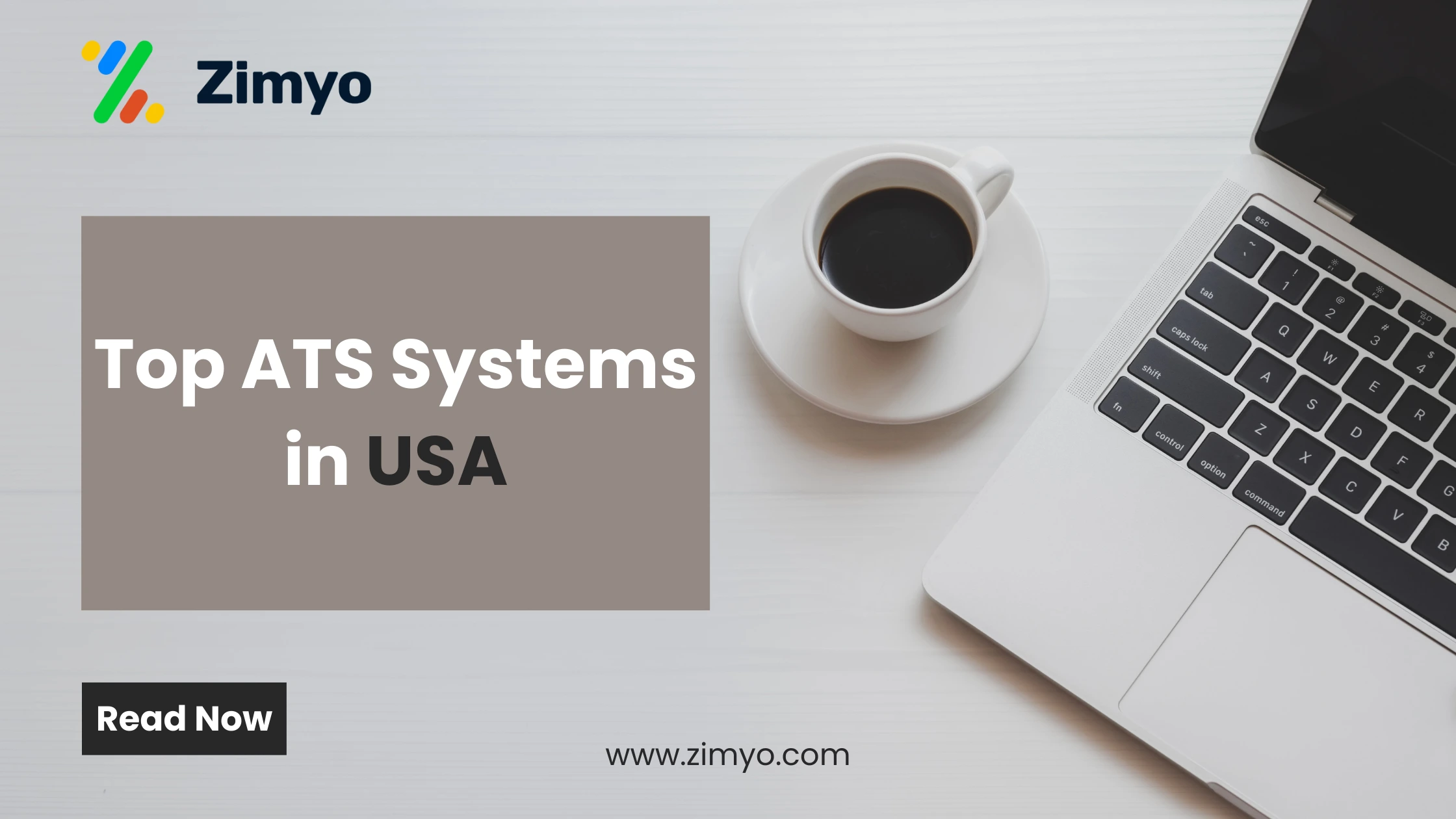You’d agree that recruitment is the backbone of a successful organization. Hiring the right talent at the right time is crucial, it doesn’t matter if you are a startup building your first team or an enterprise scaling rapidly. But here’s the twist – hiring can be messy without ATS, time-consuming, and filled with roadblocks if you don’t know how to manage well. This is where hiring solutions come into play.
Nowadays with the latest hiring software HR teams can automate repetitive tasks. They can speed up recruitment processing and focus more on finding quality candidates. Because organizations are shifting towards applicant tracking systems (ATS), candidate tracking systems, and recruitment outsourcing platforms to simplify and efficient their hiring process.
In our blog, we’ll cover all the things you need to know about hiring solutions. Starting from what they are, the best hiring platforms available, Specifications to consider, how to choose the one, and what are the benefits of using the best recruiting software for your business.
What Is Hiring Software?
Let’s try to understand the definition- Hiring software, also known as hiring platforms or ATS (Applicant Tracking Systems), is a tool created to simplify the recruitment lifecycle. This software manages tasks from posting jobs to onboarding your employees. It is designed to save your team from manual tasks such as resume screening, scheduling interviews, sending reminders, and tracking applicants through different hiring stages.
In short, hiring software is your HR’s best friend. Making the recruitment process faster, more organized, and highly efficient hence minimizes human error, saves time, and improves the candidate’s experience.
Key Functions of Hiring Software:
- Resume parsing and candidate database creation
- Automated job postings on multiple job boards
- ATS tracking system for applicants
- Scheduling and communication tools
- Reporting and analytics to measure hiring success
With this foundation, let’s dive into the best hiring solutions that can truly transform your recruitment process.
List of 11 Best Hiring Solutions for Businesses
- Zimyo
- Lever
- Jobvite
- JazzHR
- BambooHR
- Zoho Recruit
- Bullhorn
- Recruitee
- Comeet
- Loxo
- Pinpoint
Best Hiring Solutions for Businesses: In Detail
Here’s a carefully selected list of the best hiring platforms and software that businesses in any industry are employing to find, manage, and onboard top talent.
Zimyo is not only HR software but also possesses an ATS system that offers recruitment, employee engagement, performance management, and payroll solutions all-in-one package. For recruitment, Zimyo has a simple-to-use applicant tracking software that makes the entire hiring process easy and efficient.
Its hiring module allows companies to list jobs on various job boards. They can follow candidates at every stage, and coordinate with hiring managers to take informed decisions. What is unique about Zimyo is its emphasis on providing AI-based suggestions, which helps recruiters to find top candidates in a matter of minutes.
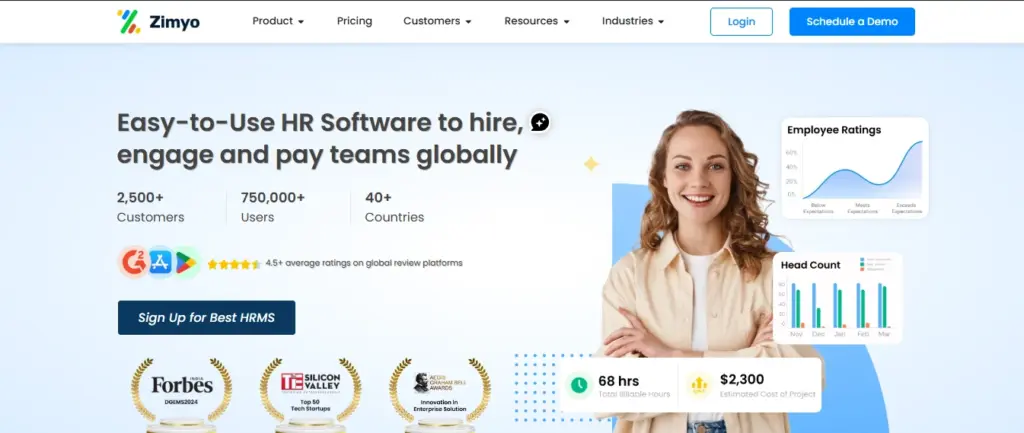
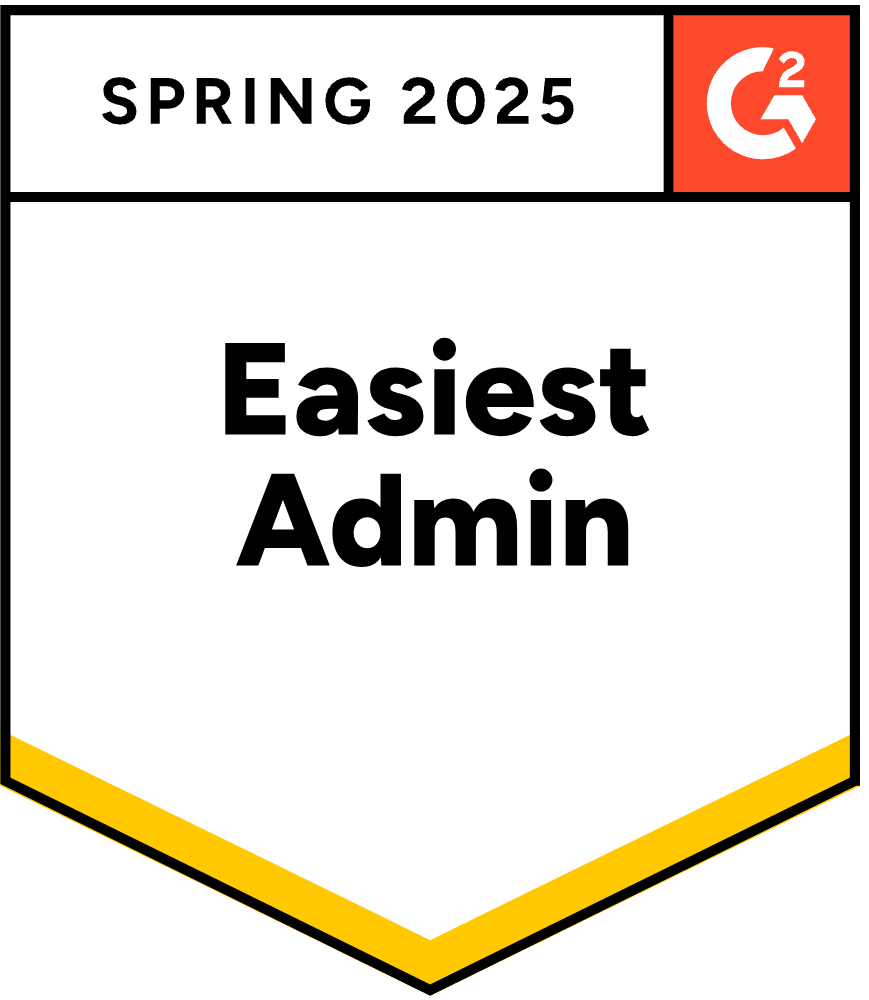
Specifications:
- Centralized candidate tracking system
- Automated job postings on leading job portals
- Advanced filters to narrow down the correct talent
- Smooth integration with HR payroll and onboarding software
- Simple collaboration between HR and recruiters
Pros:
- End-to-end HR and recruitment solution in one place
- Affordable and scalable for SMEs
- Great user interface with strong customer support
Cons:
- Some advanced recruitment Specifications may require customization
- Selective third-party integrations
2. Lever
Lever is a popular name in the recruitment technology industry, providing a solution that marries ATS with customer relationship management (CRM) capabilities. This makes it a robust solution for organizations desiring to build long-term relationships with prospective candidates without running active job postings. Lever prioritizes collaboration, enabling recruiters, hiring managers, and leadership to work together seamlessly.
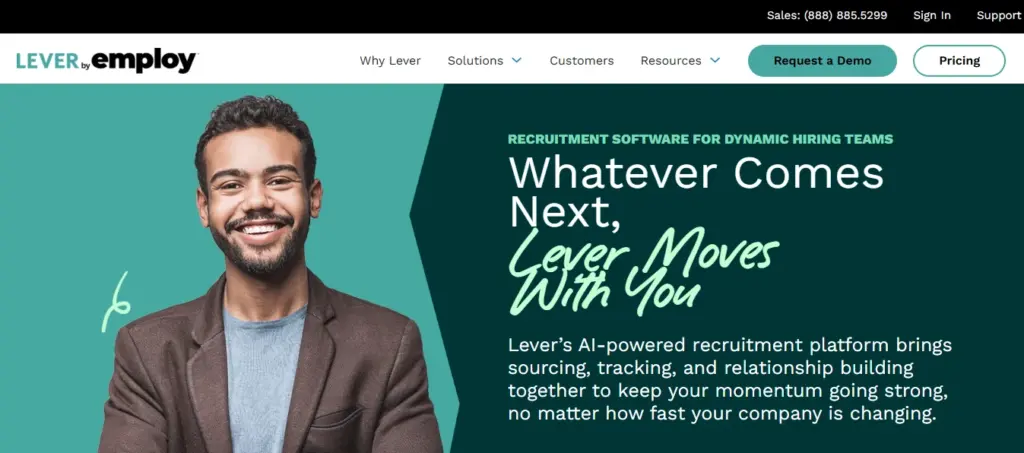
Specifications:
- Smart pipelines to track candidate journeys
- Personalized candidate engagement
- Powerful reporting dashboards
- Seamlessly integrates with productivity tools
Pros:
- Strong collaboration Specifications
- Easy-to-use dashboards
- Ideal for mid-to-large companies
Cons:
- May be more expensive for small businesses
- Steeper learning curve for new users
3. Jobvite
Jobvite is an enterprise-wide hiring solution, which has proven itself to be one of the recruitment technology leaders. It offers applicant tracking tools, recruitment marketing, onboarding, and candidate engagement. Jobvite also connects easily with social media and job boards – providing maximum visibility to vacancies.
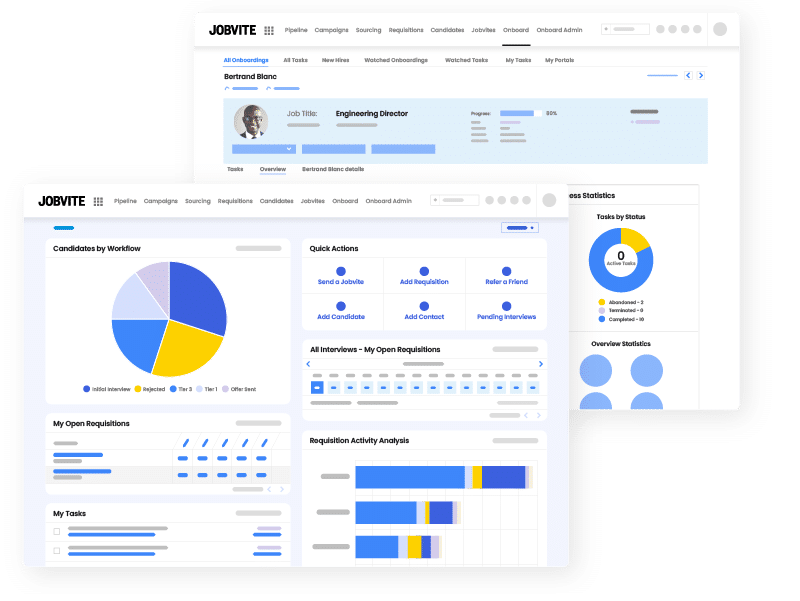
Highlights:
- AI-powered candidate recommendations
- ATS tracking system
- Built-in recruitment marketing tools
- Excellent candidate experience management
Pros:
- Strong AI-driven sourcing
- Excellent employer branding tools
- Great for enterprise-level hiring
Cons:
- Expensive for smaller companies
- Can feel overwhelming due to feature-rich interface
4. JazzHR
JazzHR serves small and medium-sized business firms with low-cost and intuitive recruitment software. It’s makes core recruitment tasks easier. Plus, it allows for workflow customization, making it easier for growing businesses to tailor processes to their needs. With an easy interface, JazzHR makes recruitment accessible to teams without dedicated HR tech specialists.
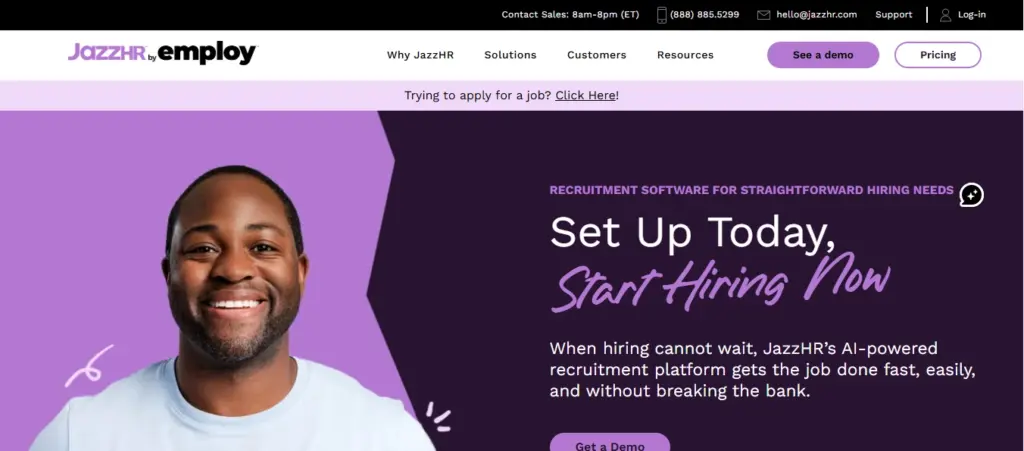
Specifications:
- Customizable workflows
- Easy-to-use ATS system
- Candidate communication automation
- Affordable pricing
Pros:
- Budget-friendly solution
- Easy implementation
- Good automation for SMBs
Cons:
- Limited analytics capabilities
- Not ideal for enterprise hiring
5. BambooHR
BambooHR is well known for being easy to use and efficient at handling the employee lifecycle. Though its ATS is less feature-laden than specialized recruitment tools, it’s an ideal fit for organizations that wish for an integrated HR tool.
Its hiring module enables organizations to post job openings, handle applications, and automate onboarding after candidates are hired. It’s particularly favored by organizations seeking to consolidate HR functions without sacrificing efficiency in recruitment.
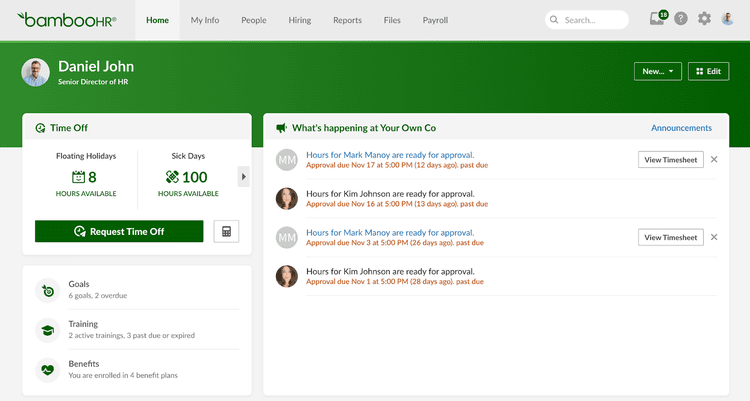
Specifications:
- Applicant tracking system
- Centralized employee database
- Seamless onboarding workflows
- HR reporting and insights
Pros:
- Simple, clean interface
- Combines HR and recruitment
- Great customer support
Cons:
- ATS Specifications are not as advanced as specialized tools
- Limited customizations for hiring workflows
6. Zoho Recruit
Zoho Recruit is an adaptable product serving both corporate HR departments and staffing firms. This supports ATS features, resume parsing, automated job advertising, and AI-based ranking of candidates.
It has one of the best advantages of integration within the overall Zoho ecosystem, thus is a favorite among companies utilizing Zoho products. It also has recruitment process outsourcing (RPO) support, which helps businesses ramp up hiring rapidly.
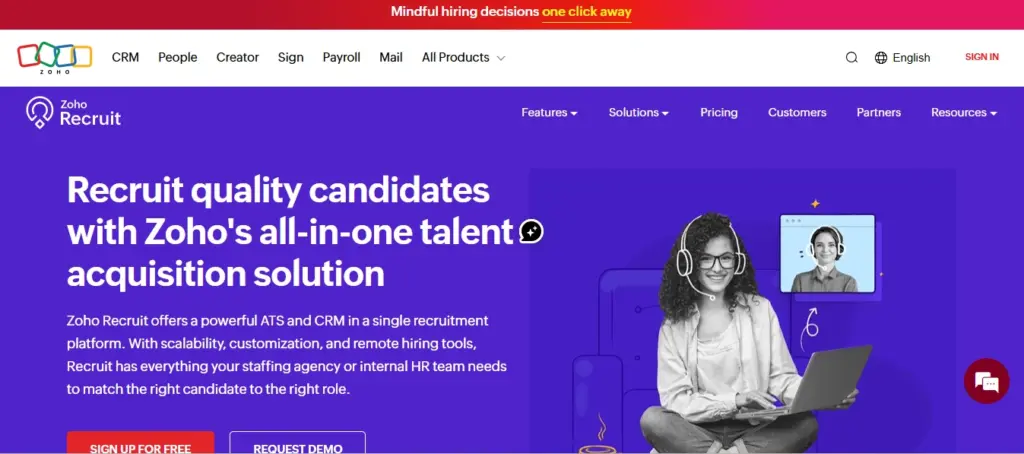
Specifications:
- End-to-end ATS system
- Candidate sourcing and resume parsing
- AI-powered candidate ranking
- Customizable hiring workflows
Pros:
- Cost-effective with flexible plans
- Easy integrations within the Zoho ecosystem
- Great for both staffing agencies and in-house HR teams
Cons:
- User interface could be more modern
- Some Specifications locked behind higher-tier plans
7. Bullhorn
Bullhorn is a top cloud-based applicant tracking system (ATS) and CRM platform for staffing and recruitment agencies. It provides sophisticated recruitment processing outsourcing features through aiding businesses to streamline placement, candidate sourcing, and management of client relationships. Through its automation, mobile recruiting, reporting, and job board integration capabilities, Bullhorn finds extensive use among high-volume recruitment agencies. Its easy-to-use nature and high scalability make it ideal both for small recruiting companies and large-scale enterprises.
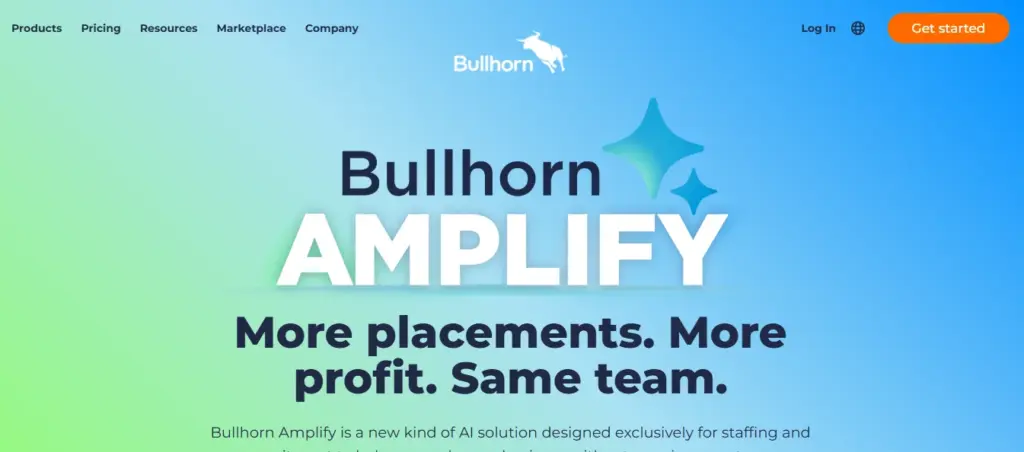
Specifications:
- Advanced candidate relationship management
- Mobile-friendly ATS system
- Recruitment automation tools
- Powerful reporting and analytics
Pros:
- Excellent for staffing firms
- Strong CRM functionality
- Reliable reporting tools
Cons:
- Expensive for smaller companies
- Setup can be complex
I was able to implement the platform on my own. It helps in assigning the tasks to other employees, conducting surveys and polls, and much more. The ease of use and self-onboarding is something that I would like to appreciate.
Sonali, Kommunicate
Zimyo simplifies attendance management for our organization. The leave and attendance are so streamlined that we have never faced any difficulties with the system.
Anurag, Eggoz Nutrition
8. Recruitee
Recruitee is a team hiring platform designed to enable teams to make more informed hiring decisions. It concentrates on enhancing teamwork collaboration, employer branding, and offering a smooth candidate experience.
Recruitee also has a career site builder, enabling companies to make branded careers pages in order to recruit best talent. Its simple-to-use dashboards enable recruiters and managers to keep track of candidates’ progress.
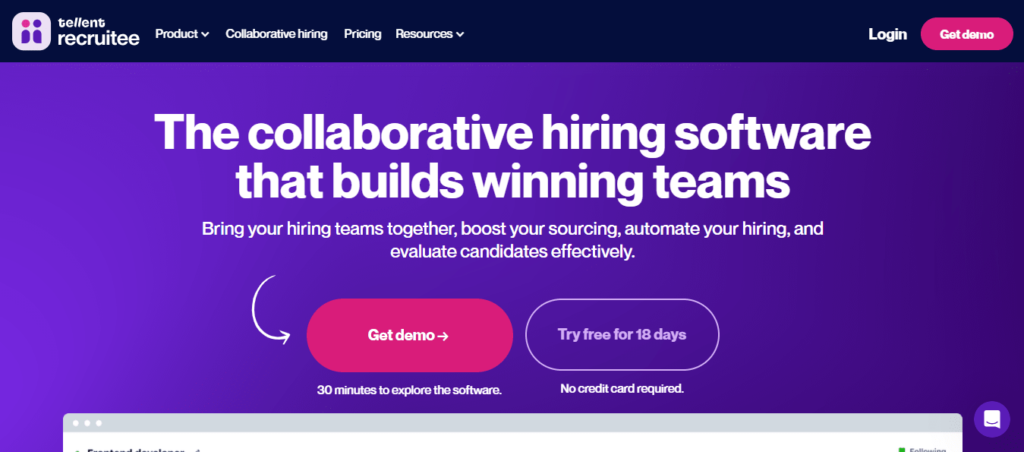
Highlights:
- Simple-to-use ATS software
- Team collaboration Specifications
- Career site builder
- Data-driven recruitment insights
Pros:
- Strong team collaboration tools
- Great candidate experience Specifications
- Good for mid-sized companies
Cons:
- Limited advanced analytics
- Can become pricey as you scale
9. Comeet
Comeet provides a process-driven and team-based recruitment solution. It supports collaborative hiring, with tools to enable all the stakeholders in decision-making.
Its candidate pipelines and automated workflows make sure hiring teams are kept on track, and its interface simplifies things for recruitment.
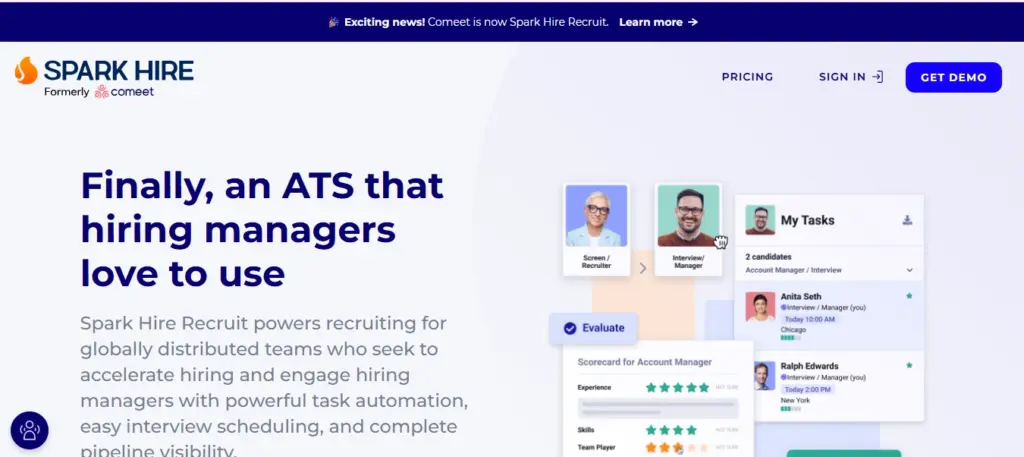
Specifications:
- Automated workflows
- Collaborative decision-making tools
- Candidate pipelines
- ATS and candidate tracking system
Pros:
- Collaborative, team-focused hiring
- Intuitive workflows
- Good automation Specifications
Cons:
- Limited integrations with external tools
- Best suited for SMBs rather than large enterprises
10. Loxo
Loxo is a contemporary AI-driven recruitment platform dedicated to sourcing and outreach. It combines ATS capabilities with sophisticated recruiting automation and a robust candidate database. Recruiters can use AI to efficiently spot and match candidates to available jobs, and its multi-channel communication tools make outreach a breeze.
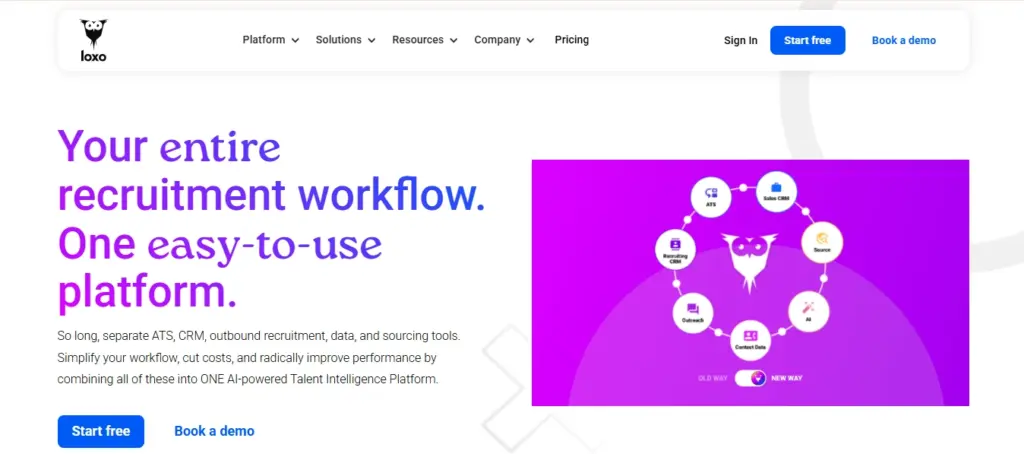
Highlights:
- AI-powered recruiting automation
- Candidate tracking system
- ATS with smart matching
- Multi-channel communication tools
Pros:
- AI-driven sourcing saves time
- Excellent outreach tools
- Modern, intuitive design
Cons:
- Learning curve for AI Specifications
- Not as customizable as some competitors
11. Pinpoint
Pinpoint is an applicant tracking system developed with a concentration on enhancing employer branding and minimizing cost per hire. It focuses on recruitment marketing in conjunction with ATS functionality, allowing companies to find high-quality candidates.
With powerful analytics, Pinpoint offers actionable insights into hiring performance and identifies areas for improvement. It can be easily integrated into other HR software, which makes it a good fit for contemporary HR teams
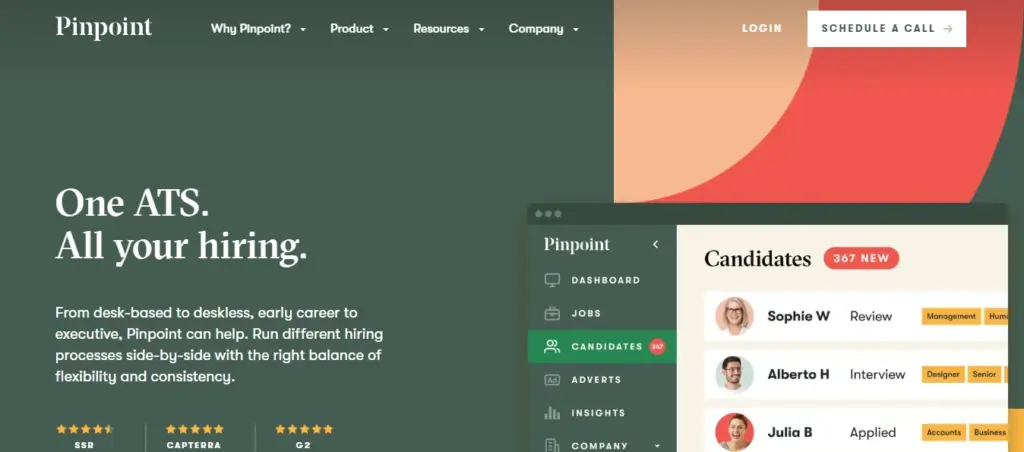
Specifications:
- ATS and candidate tracking software
- Recruitment marketing Specifications
- Data analytics for hiring performance
- Easy integration with HR systems
Pros:
- Great employer branding tools
- Strong analytics
- Designed for reducing cost per hire
Cons:
- Pricing may not suit very small businesses
- Fewer integrations compared to larger platforms
Must-Have Specifications in Your Hiring Solutions
It’s essential to go beyond the fancy of features and actually understand what simplifies your process. So, when you’re evaluating the best hiring platforms, make sure they include these must-have Specifications:
- Applicant Tracking System (ATS): Tt’s a fundamental feature to track candidates from application to hiring.
- Automation Tools: Consider resume parsing, interview scheduling, and reminders to save you hours of time.
- Collaboration Tools: Specifications that allow recruiters, hiring managers, and HR teams to coordinate seamlessly.
- Analytics & Reporting: Metrics to measure cost per hire, time to hire, and overall recruitment efficiency.
- Integration Capabilities: Compatibility with job boards, payroll software, HRMS, and communication tools.
- Candidate Engagement Tools: Automated emails, chatbots, and real-time updates to enhance candidate experience.
- Customizable Workflows: Flexible pipelines tailored to your unique recruitment process.
- Mobile Access: For recruiters and candidates to stay connected anytime, anywhere.
How to Choose the Right Hiring Solutions (Step-by-Step Guide)
Finding the best hiring software isn’t about picking the most popular one. It’s about choosing what fits your organization’s unique needs. Here’s a step-by-step guide:
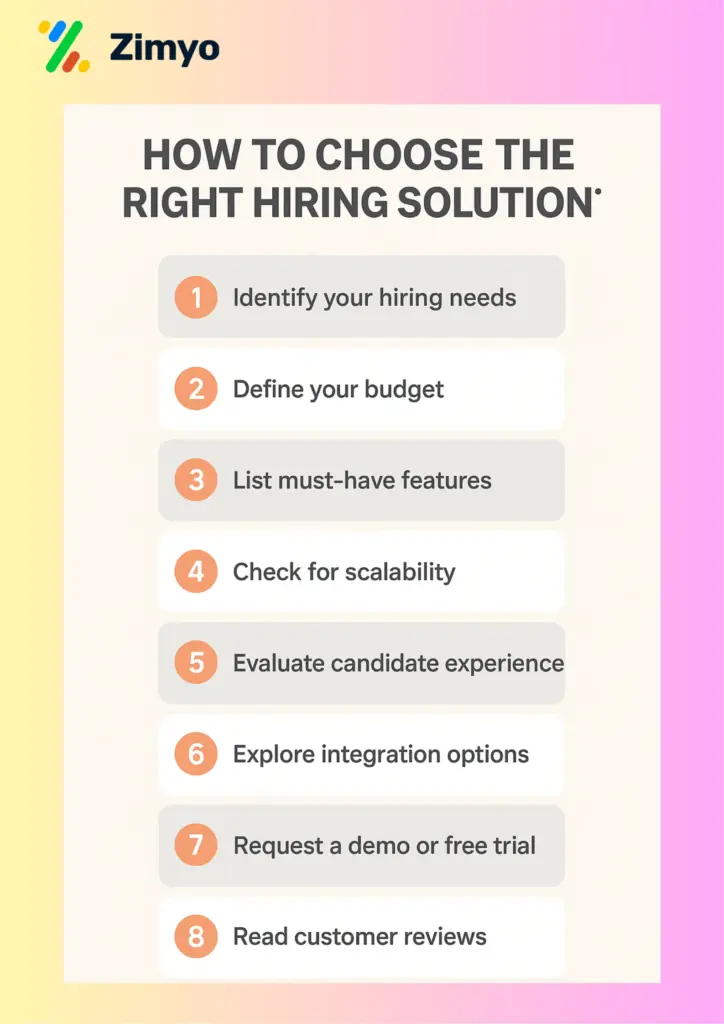
- Identify Your Hiring Needs: Determine whether you need occasional hiring support or a solution for high-volume recruitment.
- Define Your Budget: Hiring platforms vary in cost. Assess ROI and set clear budget limits.
- List Must-Have Specifications: Create a checklist of critical Specifications (ATS, automation, reporting, etc.).
- Check for Scalability: Choose software that grows with your business needs and employee base.
- Evaluate Candidate Experience: The system should ensure a smooth and engaging journey for applicants.
- Explore Integration Options: Look for compatibility with HRMS, payroll, and communication tools.
- Request a Demo or Free Trial: Test the software in real-time to check usability and efficiency.
- Read Customer Reviews: Understand other businesses’ experiences with the hiring platform.
Benefits of the Best Candidate Tracking System
Investing in a robust candidate tracking system can revolutionize the way you recruit. Here are some benefits:
- Saves Time: Automation reduces manual efforts, letting HR focus on strategic tasks.
- Improves Candidate Experience: Smooth and transparent processes enhance employer branding.
- Boosts Quality of Hire: Data-driven insights help recruiters identify the best-fit candidates.
- Reduces Recruitment Costs: Minimize ad spend and hiring mistakes through targeted recruitment.
- Enables Better Collaboration: Recruiters, managers, and HR teams can work in sync on one platform.
- Scalable & Flexible: Handle recruitment surges without compromising quality.
- Ensures Compliance: Tracks documentation and processes in line with labor laws.
What Else Does Zimyo Offer?
While Zimyo is recognized as one of the best hiring solutions for businesses, it goes beyond just recruitment. Zimyo offers a comprehensive suite of HR products all designed to help organizations manage their entire employee lifecycle in one place:
Features:
- HRMS (Human Resource Management System): Zimyo is robust platform to handle employee data, HR processes, and organizational workflows with ease.
- Payroll Management System: This feature allows you to automate salary processing, tax compliance, and payslip generation to ensure accuracy and timely payouts.
- Performance Management: You will be able to track employee goals, set OKRs, and conduct continuous performance reviews to boost productivity.
- Employee Engagement Suite: This contains surveys, feedback mechanisms, and recognition tools to keep employees motivated and satisfied.
- Attendance & Leave Management: Allows youto track employee work hours, manage shifts, and automate leave approvals seamlessly.
- Expense & Travel Management: Simplifies reimbursement requests, approvals, and expense tracking.
- Employee Self-Service Portal: Empowers employees to access payslips, apply for leaves, and update personal details without HR intervention.
Final Thoughts
Understand that hiring processes are evolving, getting smarter. And businesses that rely on outdated methods risk themselves falling behind in securing top talents. Irrespective whether you’re a small business or an enterprise, adopting modern hiring solutions such as ATS tracking systems and best recruiting software will power your recruitment process. Giving you a competitive edge.
Going from Zimyo’s all-in-one HR ATS system with AI-powered features to Bullhorn equipped with both ATS and CRM, there’s a solution for every type of business. The key to choosing lies in identifying your needs. Understand the Specifications you value most and make a choice that aligns with your growth strategy.
Remember that recruitment is more than filling positions; it’s about building the right team. And the right hiring software can make all the difference.
FAQs
How to streamline the recruitment process?
Use an ATS and automation tools to speed up resume screening, interview scheduling, and candidate communication.
What are the three C's of recruitment?
Competence, Compatibility, and Commitment—key factors to hiring the right talent.
Which HR software is best?
Zimyo is one of the best HR software for businesses, offering ATS, payroll, performance, and engagement tools in one platform.
What is the biggest HR challenge in recruitment
The biggest challenge is finding and retaining top talent, which hiring platforms help solve with automation and analytics.

